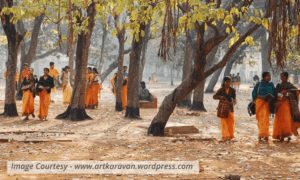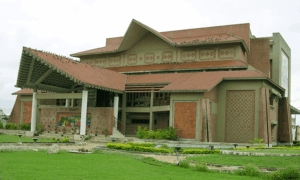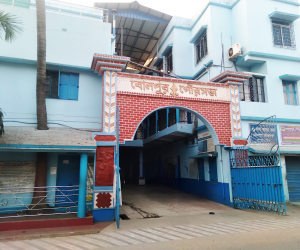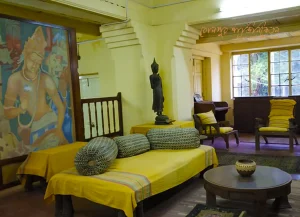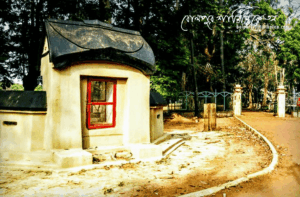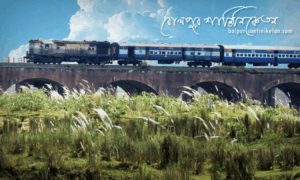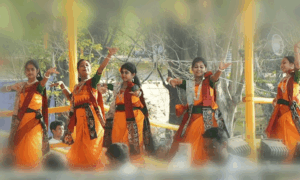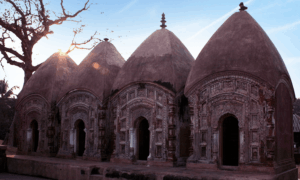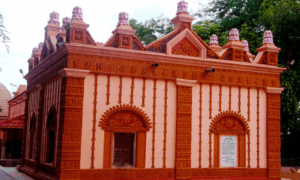Rabindranath Tagore (1861-1941) was much more than just a poet; he was a true polymath, a towering figure in Indian history and culture, whose influence resonates even today. A poet, philosopher, playwright, composer, novelist, painter, and educationist, Tagore reshaped Bengali literature and music, and profoundly impacted Indian art. His life’s work is intrinsically linked with Santiniketan, a place he nurtured into a unique centre of learning and art.
A Short Biography of Rabindranath Tagore
Born on May 7, 1861, in Calcutta (now Kolkata) to Debendranath Tagore and Sarada Devi, Rabindranath came from a prominent Bengali Brahmin family deeply involved in the Bengal Renaissance. He was the youngest of thirteen surviving children. Though he received little formal schooling, his extensive travels and the intellectual environment at home shaped his early education. He began writing poetry at a young age, displaying an extraordinary talent that would soon captivate the literary world. His travels across various continents greatly influenced his universal outlook, which later became the cornerstone of his educational philosophy.
The Genesis of Santiniketan: A Dream Takes Root
The history of Santiniketan and Rabindranath Tagore is a story of a dream taking shape. Originally a peaceful ashram founded by his father, Maharshi Debendranath Tagore, in 1863, Rabindranath envisioned it as an open-air school, a stark contrast to the rigid classroom environments of his time. In 1901, he established his experimental school, Brahmacharyacharya. His aim was to create an educational institution where learning was joyful, connected to nature, and fostered holistic development rather than just rote memorisation. This was the humble beginning of what would later become the renowned Visva-Bharati University.
Nobel Prize & Global Recognition
One of Rabindranath Tagore’s most significant achievements was becoming the first non-European to win the Nobel Prize in Literature in 1913. This prestigious award was bestowed upon him for his profound collection of poems, Gitanjali (Song Offerings). The Nobel Committee recognized his “profoundly sensitive, fresh and beautiful verse, by which, with consummate skill, he has made his poetic thought, expressed in his own English words, a part of the literature of the West.” This award catapulted Tagore onto the global stage, making him an international literary icon and bringing immense pride to India.
Literary Masterpieces: Novels, Poetry & Plays
Tagore’s literary output was vast and diverse. While Gitanjali earned him global fame, his contributions spanned across genres. Some of his best works include:
- Novels:
- Gora (exploring Indian identity and nationalism)
- Ghare Baire (The Home and the World) (a powerful critique of nationalism and modernity)
- Chokher Bali (A Grain of Sand) (a psychological exploration of relationships)
- Shesher Kobita (Farewell Song) (a poignant romantic novel)
- Poetry Collections: Manasi, Sonar Tori, Balaka, Purbi
- Plays: Raktakarabi (Red Oleanders), Dakghar (The Post Office), Chitrangada
His writings, rich in symbolism and emotional depth, continue to be studied and cherished worldwide.
Rabindranath Tagore and Visva-Bharati: A Universal University
The deep connection between Rabindranath Tagore and Visva-Bharati is the cornerstone of Santiniketan’s identity. From his experimental school, Tagore gradually expanded his vision, culminating in the establishment of Visva-Bharati as a university in 1921. Its motto, “Yatra Visvam Bhavaty Eka Nidama” (Where the whole world meets in one nest), encapsulated his dream of a global university promoting cultural exchange and understanding between East and West. Visva-Bharati became a melting pot of ideas, attracting scholars and artists from around the world, embodying Tagore’s universalistic ideals.
The Soulful World of Tagore’s Songs (Rabindra Sangeet)
No discussion of Rabindranath Tagore is complete without mentioning his unparalleled contribution to music – Rabindra Sangeet. He composed over 2,000 songs, blending traditional Indian classical forms with folk melodies and Western influences. These songs are not just musical compositions; they are poetic narratives, philosophical treatises, and expressions of profound human emotions – love, devotion, nature, and patriotism. Two of his compositions serve as national anthems: ‘Jana Gana Mana’ for India and ‘Amar Shonar Bangla’ for Bangladesh, a testament to his immense cultural impact.
Legacy of a Visionary
Rabindranath Tagore’s legacy extends far beyond his literary achievements. He ignited a cultural awakening in India, championed humanism, advocated for education reform, and promoted universal brotherhood. His vision for Santiniketan and Visva-Bharati continues to inspire, offering a unique model of education deeply rooted in Indian traditions yet open to global influences. His words, his music, and his ideals continue to guide and enrich countless lives.
